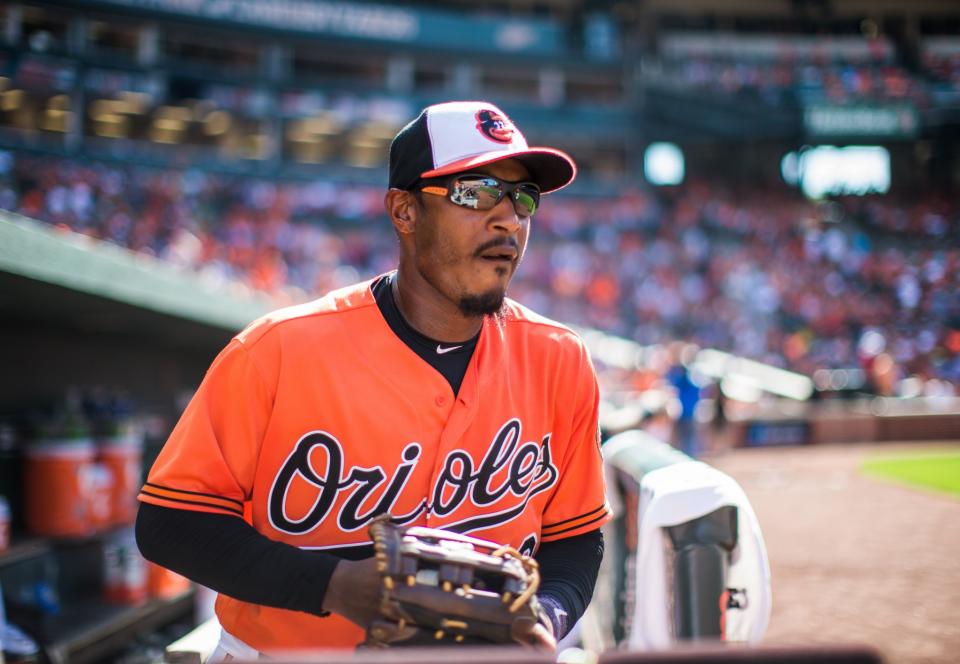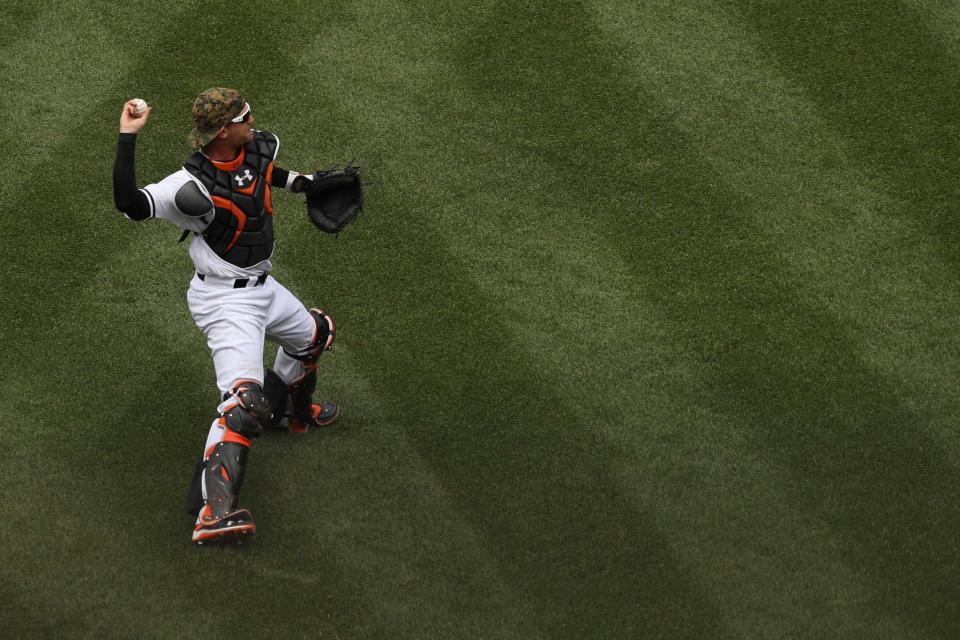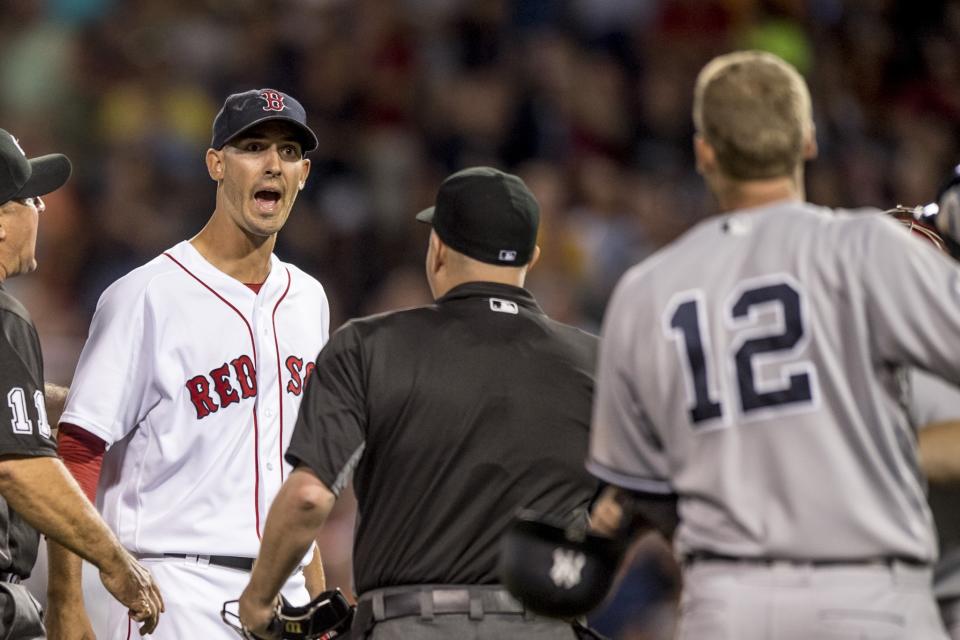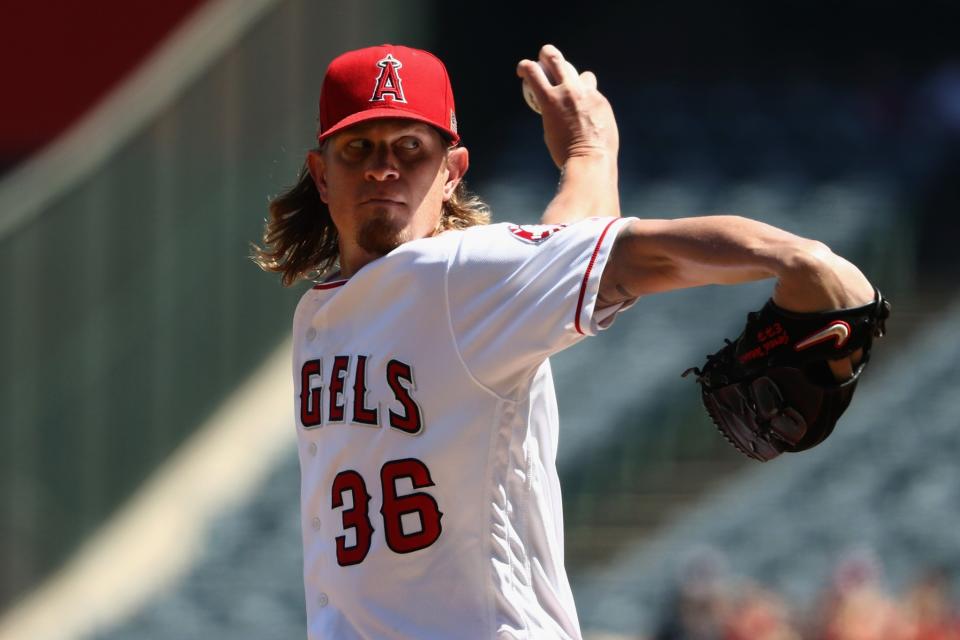Adam Jones is right, but where does baseball go from here?
Five months ago, Jackie Robinson’s daughter, Sharon, stood on a school playground in Los Angeles. The day was to honor her father, but also to recognize the children on the playground who ran this way and that, and chattered in two or three languages, and did not all look quite the same. They would play ball, and it was chaos, that perfect chaos of children having a wonderful time on a level (blacktop) playing field.

Amid the bedlam, she was asked, as she always is, as she always will be, what Jackie would think of the baseball world today. She sighed, not for the repetitiveness of the question, I gathered, but for the repetitiveness of her answer.
“My father fought his entire life – and fights through all of us – to achieve equality in America,” she said. “Yes, he’s hopeful today.”

Present tense.
“I think he’d feel disappointed we’ve continued to struggle to build our numbers in baseball,” she continued. “Yet we see more brown faces on the playing fields. My father is the kind of person who would want to remind us we still have a ways to go.”
Her words were, as ever, smart and sincere. The real meaning, however, may have been in her sigh. The fight has been long and hard. Too long. Too hard. And here we are, all these decades later, wondering what happened. Or, what hasn’t happened. Our game is more colorful. To use Ms. Robinson’s word, browner.
Yet, does it seem equal to you? Does it seem to have grown, spread to everyone?
I loved what Adam Jones said this week. I agree with him. I loved that he said it and what comes next – for most – is a reasonable conversation, that the world didn’t collapse around him, that he went out and played center field at Fenway Park in Boston for three hours, and that urban baseball academies in Compton, in Cincinnati, in Philadelphia, in Houston, in New Orleans, in Gurabo, Puerto Rico opened their doors for another day.
“Baseball,” he told USA Today, “is a white man’s sport.”
There’s not much getting around that, is there? Commissioners, owners, general managers, field managers, coaches, scouts, the majority of the players and, perhaps, those who watch and write about the games are white.
So here we are. Again. Still.
I wonder how Jones’ words will play. If you are a parent of one of those boys and girls who shows up on those ball fields in Compton, and if that child asks about what Adam Jones said, does that become an encouraging moment? Or is it discouraging? Does it look hopeless out there? Or does the honesty play in the words of a strong man who looks like they do? Does any of it register at all?
Here are the numbers in major league baseball:
8 percent African-American
27 percent Latin American
There are puffs of change. In the past draft, six of the top 24 picks were African-American or Latin American, along with 10 of the top 41 and 17 of the first 77. Over five drafts, 34 of 168 first-rounders were African-Americans.
That’s where we are, in part. The concern is what now? What next? More academies, more outreach, more diversity, more voices, more leaders, more expression, more individuality, more marketing and more vision.
Then, of course, more men such as Adam Jones. And fewer sighs.
A WEEK BEHIND:
Caleb Joseph, backup catcher for the Orioles, is having a season that is … that is … gosh, what am I looking for here … ill fated.
Start with the foul ball off the cup that required surgery, and not on the cup. That alone would qualify as ill fated. So, so ill fated.
As Dan Connolly of BaltimoreBaseball.com has pointed out, Joseph’s run of bad juju has not been limited to behind the plate. Beside it, Joseph has endured a year that is not so much bad as it is, I don’t know, immeasurable, implausible, incomprehensible. Start there.

A highly capable catcher and a .216 hitter in parts of three seasons, Joseph has come to the plate 132 times in 2016, has 124 at-bats, and has – ready? – zero RBI. Fifty-four at-bats with men on base, 26 with at least one in scoring position and … bupkis.
This is a man who, among other virtues, has 20 career home runs. All of them, obviously, before this season.
He has eight hits, one of them a double, with men on base. He has two hits with runners in scoring position.
And yet.
Not a bases-loaded hit-by-pitch. Not a 16-hopper that nudges somebody 90 feet. Not a sacrifice fly. Not a suicide squeeze. Not a curler around the foul pole.
C’mon.
Connolly looked it up, and Joseph is on the verge – two weeks qualifying as the verge – of becoming the first big-leaguer with at least 100 at-bats in a season to fail to drive in a run since 1920. It probably doesn’t stop there, either, except RBIs do. They weren’t a real statistic until 1920.
So, yeah, root for Caleb Joseph’s RBI. Think of it as fate.
A WEEK AHEAD:
The answer is 2007. So nine years ago. The question: When was the last time the Red Sox and Yankees finished a season within five games of each other? Nine years. In that time, the average separation is nearly 11 games. That’s not a rivalry, it’s a geographic accident. They may not rub up against each other this year either, but we’re about to find out.
In the next 15 days, the Red Sox and Yankees will play seven times. The Yankees have to beat not only the Red Sox, but just about everybody. That’s a gauntlet of Red Sox, Blue Jays and Orioles. The Red Sox have slightly more flexibility, though one never knows what today will bring.

Here goes nothin’, starting with four at Fenway.
The probables:
Thursday: Masahiro Tanaka vs. Eduardo Rodriguez
Friday: Luis Cessa vs. Clay Buchholz
Saturday: Bryan Mitchell vs. David Price
Sunday: CC Sabathia vs. Drew Pomeranz
On the topic of rivalries – dead or alive – the Giants are just sure enough of themselves, and the Dodgers just flawed enough, to make the last couple weeks in the West a curiosity. They play six more times, three in L.A. early next week, and the final three of the season at AT&T Park.
The probables:
Monday: Madison Bumgarner vs. Clayton Kershaw
Tuesday: Johnny Cueto vs. Rich Hill
Wednesday: Matt Moore vs. Kenta Maeda
SAW IT COMING:
Carlos Gomez as an Astro: 323 plate appearances, .210 batting, .272 on-base, .594 OPS, 5 home runs, 29 RBI.
Carlos Gomez as a Ranger: 64 plate appearances, .222 batting, .329 on-base, .789 OPS, 4 home runs, 12 RBI.
Don’t know what all went on in Houston. The Rangers have suggested Gomez rework his mechanics only slightly, limiting his head movement, allowing him to stay back on the ball rather than lunging at it. So far, so OK. Better anyway.
“The skill set is as good as anybody’s,” Rangers manager Jeff Banister says. “The hitting part has been challenging for him. But he still has the skills. He still has a chance to hit.”
DIDN’T SEE IT COMING:
Jered Weaver, if his disposition on the mound weren’t sufficiently telling, can be a fairly surly man. The glowering, the glove-shouting, the slow trudge to the dugout, it’s not always restricted to game time, and maybe that’s the person and maybe that’s the ballplayer, and either way he won a lot of baseball games and collected his share of Cy Young votes as a result.
Thing is, it is impossible not to admire the guy, and not for the results, whatever they may be, but for the way he seeks them. Pitchers lose their fastball all the time. Thirty-three-year-old pitchers who tangle themselves and crossfire and never give an inch, maybe them as often as any.

Two years ago, Weaver won 18 games and had a 3.59 ERA over 213 1/3 innings. Then, poof. Injuries. Setbacks. New strategies. Newer strategies. And still the same guy who wanted the ball – needed the ball, perhaps – and stood out there with an ERA near 6 and a fastball that couldn’t save him against hitters who weren’t afraid anymore. But, then, neither is he afraid. He beat the Rangers on Sunday afternoon when he allowed four hits across 6 2/3 innings, when his best fastball – the one with a breeze behind it – registered 84 mph.
He’s won 11 games. The Angels have won 14 times with him on the mound. You’ve seen the Angels, you know how often they’ve won, and the man who leads them in wins is the guy who has only that to pitch for. Win the game. Move on to the next. It’ll hardly ever be pretty, and the statistics under the statistics are unkind, so what’s left for him is to compete, which was always him anyway.
His contract is nearly done. He could go home, call it a nice career. I hope he doesn’t. I hope he keeps trying. I hope he wins again, and then screams something terrible into his glove.


